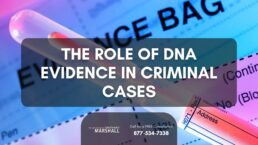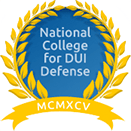
DNA evidence plays a larger role than ever in New Jersey criminal cases, helping to convict defendants and exonerate those wrongly accused or convicted. Because no two people have the same genetic makeup, DNA evidence collected from a crime scene can be used to link a suspect to a crime or to eliminate them from suspicion.
DNA evidence can be used to solve several types of crimes, including violent crimes like murder and sexual assault, as well as nonviolent crimes, such as vehicle break-ins. In New Jersey, DNA may not be obtained from a suspect without the issuance of a warrant. Further, DNA collection and interpretation methods are not infallible, and their accuracy can be challenged.
If you face criminal charges in New Jersey and understand that prosecutors have DNA evidence, you need the guidance of an experienced criminal defense lawyer who understands how DNA evidence is used in criminal cases. A skilled criminal lawyer from the Law Offices of Jonathan F. Marshall can review records of the police investigation and potentially challenge DNA evidence presented against you as part of our overall defense.
Contact the Law Offices of Jonathan F. Marshall today for a free initial legal consultation. The criminal defense lawyers at our firm are former prosecutors and public defenders from across New Jersey. Our law firm can defend you in a criminal case that relies on DNA evidence and ensure that your rights are fully upheld. Contact us today about a case in Middlesex County, Passaic County, Union County, Monmouth County, Ocean County, Hudson County, Mercer County, Morris County, or anywhere in New Jersey.
What Is DNA Evidence in Criminal Cases?
DNA is the human body’s building block. Virtually every cell in your body contains DNA. The DNA in a person’s blood is the same as the DNA in their saliva, skin tissue, hair, and bone. A person’s DNA never changes. This makes DNA an important tool for identifying criminal suspects.
DNA evidence collected from a crime scene can be linked to a suspect or can eliminate a suspect from further investigation. During a sexual assault, for example, hair, skin cells, semen, and blood can be left on the victim’s body or other parts of the crime scene.
DNA samples may come from:
- Known Individuals. The most common DNA reference samples collected from known individuals are blood, cheek swabs, and plucked hairs.
- Unidentified Bodies. Samples collected from unidentified bodies may come from blood, buccal swabs, hairs, bone, teeth, fingernails, tissues from internal organs, muscle, and skin.
- Crime Scenes. DNA samples collected at a crime scene can come from any biological sample, including liquid blood or bloodstains, liquid saliva or saliva stains, and semen stains deposited on virtually any surface; genital/vaginal/cervical samples; anal swabs; penile swabs; pieces of tissue/skin; fingernails; hairs; skin cells on drinking vessels, clothing; and urine.
- Other DNA sources. When individuals are reluctant to provide samples, DNA may be collected from:
- Clothing where biological fluids may be deposited (e.g., crotches of underwear or blood-, saliva-, or semen-stained items)
- Other clothing in close contact with the body where skin cells may have rubbed off (e.g., collars, waistbands, hats)
- Bedding
- Fingernail clippings
- Teeth
- Cigarette butts
- Toothbrushes
- Hairs in razors and hairbrushes
- Discarded facial tissues or handkerchiefs with nasal secretions
- Condoms
- Gum
- Feminine products
- Pathology paraffin blocks or slides from surgery or autopsy.
DNA properly collected from the victim’s body or the crime scene can be compared with known individuals’ samples to determine whether a suspect was at the scene of the crime.
Known individual samples may come from a suspect or the national, state, or local Combined DNA Index System (CODIS). If no suspect exists, a DNA profile from the crime scene or other sources can be entered into the database and compared to DNA from convicts and suspects throughout the United States or to multiple crime scenes to connect serial crimes.
In New Jersey, anyone who has been convicted of an indictable offense is required to provide a DNA sample so it may be used in future law enforcement investigations. Absent a felony conviction, DNA cannot legally be obtained from a suspect in New Jersey without a search warrant or the suspect’s permission.
You should never volunteer to submit DNA evidence without the guidance of an experienced criminal defense attorney. If you have contacted a lawyer to represent you, give your attorney the opportunity to object to a request or challenge a warrant for a DNA sample from you.
The Impact of DNA Evidence in Criminal Cases
DNA evidence may be used in the criminal justice system to identify a suspect and places where a suspect was present.
DNA evidence can be used in court to:
- Identify suspects
- Confirm testimony
- Place a person at a crime scene.
DNA evidence can also help a defense attorney challenge the prosecution’s evidence against their client, such as by excluding the defendant as the source of DNA evidence and/or showing that the defendant’s DNA was not found at the crime scene. DNA may show that a defendant was at a crime scene, but it cannot be used to determine when the suspect was at the crime scene.
Challenges and Limitations of DNA Evidence
DNA evidence is considered more reliable than many other types of crime scene evidence. But it is not infallible. The accuracy of DNA evidence can be challenged. As your criminal lawyers, we can examine and challenge DNA evidence based on:
- Improper DNA analysis. Interpretation of DNA evidence can be subjective, with results dependent on the analyst’s experience, expectations, and preconceptions.
- Chain of custody. If there are gaps in the documentation or if it cannot be established who had control of DNA evidence at certain times, a criminal defense lawyer may argue that the evidence has been mishandled and may be unreliable.
- Contamination of sample. DNA samples can be contaminated at any stage of the process, from collection to analysis, resulting in inaccurate results. Environmental factors such as heat, sunlight, bacteria, and mold can destroy DNA evidence.
- Witness expertise. Prosecutors typically rely on expert witnesses to explain the accuracy and relevance of DNA evidence to judges and jurors. We may challenge the qualifications or credibility of prosecution experts and offer our own experts to provide alternative interpretations of the evidence.
Contact Our Criminal Defense Lawyers at The Law Offices of Jonathan F. Marshall
Never face criminal charges in New Jersey without representation from a knowledgeable criminal defense attorney. Understanding the evidence against you, including DNA evidence, and its significance to the prosecution’s case is crucial for a robust defense.
The criminal defense attorneys at the Law Offices of Jonathan F. Marshall have an in-depth understanding of New Jersey criminal law and the collection and use of DNA evidence. We have the knowledge and experience to seek the best possible outcome for you.
Contact the Law Offices of Jonathan F. Marshall today for a free consultation.











